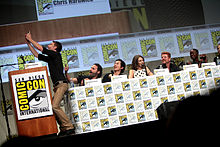Panel discussion

A panel discussion, or simply a panel, involves a group of people gathered to discuss a topic in front of an audience, typically at scientific, business, or academic conferences, fan conventions, and on television shows. Panels usually include a moderator who guides the discussion and sometimes elicits audience questions, with the goal of being informative and entertaining.[1][2] Film panels at fan conventions have been credited with boosting box office returns by generating advance buzz.
Format

The typical format for a discussion panel includes a moderator in front of an audience.[3]
Television shows in the English-speaking world that feature a discussion panel format include Real Time with Bill Maher, Loose Women, The Nightly Show with Larry Wilmore, as well as segments of the long-running Meet the Press.[4] Quiz shows featuring this format, such as QI and Never Mind the Buzzcocks, are called panel games.
Fan conventions
Panels at sci-fi fan conventions, such as San Diego Comic-Con and New York Comic-Con, have become increasingly popular; there are typically long lines to get access to the panels.[5] The panels often feature advance looks at upcoming films and video games.[6] Panels and the early screenings at conventions have been credited as increasing the popularity of blockbuster films in recent years.[7]
One of the earliest film panels was at the 1976 San Diego Comic-Con, when publicist Charles Lippincott hosted a slideshow—in front of a "somewhat skeptical" audience—for an upcoming film called Star Wars. Five years later, the Blade Runner panel at the 1981 San Diego Comic-Con featured a film featurette, before featurettes were popular. At the 2000 event, The Lord of the Rings: The Fellowship of the Ring preview panel ushered in today's era of hugely popular panels.[8]
Manels

A manel is a panel whose participants are all men. The term is a portmanteau word deriving from man and panel. The Oxford Dictionaries and Cambridge Dictionaries teams both published blogposts on the word in 2017, suggesting the term was new at that time.[9][10] In the second decade of the twenty-first century, such panels, in academia, the private sector, the media, government, and beyond, became the object of feminist critique and of extensive media discussion,[11][12][13] as well as academic research.[14][15] Commentators challenged conference organisers and speakers to refuse to present manels. Organisations responding included The Financial Times, whose board decided in August 2017 to end men-only conference panels, and encouraged its journalists not to participate in these elsewhere.[16]
See also
References
- ^ "Panel Discussions". Nature Education. Retrieved 16 April 2015.
- ^ Kirsner, Scott (30 May 2013). "How To Moderate a Panel Like a Pro". Harvard Business Review. Retrieved 16 April 2015.
- ^ "Inside Our Schools: Teen-Age Congress". Billboard. 12 April 1952. Retrieved 17 April 2015.
- ^ Hruby, Patrick (28 March 2012). "Bill Maher's 'Real Time': The survival manual for conservative panelists". Washington Times.
- ^ Sacks, Ethan (27 September 2014). "New York Comic Con will start with 10-day 'Super Week' as convention grows in size and popularity". New York Daily News. Retrieved 16 April 2015.
- ^ Lamar, Cyriaque (17 July 2013). "4 Miserable Experiences You Can't Avoid at Comic-Con". Cracked. Retrieved 16 April 2015.
- ^ Burke, Liam (2015). The Comic Book Film Adaptation: Exploring Modern Hollywood's Leading Genre. Univ. Press of Mississippi. p. 125. ISBN 9781626745155.
- ^ "The 10 Most Memorable Panels In Comic-Con History". Film.com. 16 July 2013. Retrieved 16 April 2015.
- ^ Jeff Sherwood, 'On the radar: manel', OxfordWords (5 July 2017).
- ^ Cambridge Words, 'New words – 30 October 2017', About Words: A Blog from Cambridge Dictionary (30 October 2017).
- ^ Olivia Crellin, 'Only men at your event? This blog will shame you', BBC Trending (27 May 2015).
- ^ Brigid Schulte, 'There’s No Excuse for All-Male Panels. Here’s How to Fix Them', Slate (6 October 2017).
- ^ Mary Elizabeth Williams, 'The "manel" in academia: Why are no women historians coming to a big event?', Salon (16 March 2018).
- ^ Sara Wallace Goodman and Thomas B. Pepinsky, 'Gender Representation and Strategies for Panel Diversity: Lessons from the APSA Annual Conference', SSRN (20 December 2018), doi:10.2139/ssrn.3297654.
- ^ J. Bouvy and M. Mujoomdar, 'All Male Panels and Gender Diversity of Issue Panels and Plenary Sessions at ISPOR Europe', Preprints (2019), 2019030238.
- ^ Michael Skapinker, 'Ending men-only panels is a spur to creativity', Financial Times (24 April 2018).
